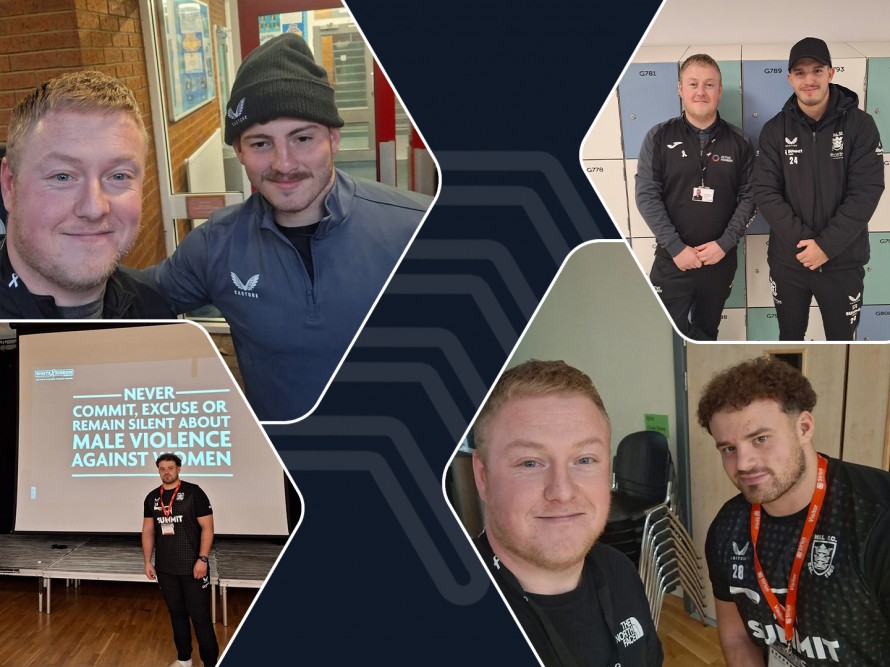

This year, I had the incredible privilege of working alongside Hull FC to deliver assemblies to secondary schools across Hull. In total, I spoke to over 2,500 young people, encouraging them to make a powerful promise: to never use, excuse, or remain silent about male violence against women.
As an ambassador for White Ribbon, an organisation dedicated to ending male violence against women, this experience was both inspiring and humbling. The White Ribbon campaign is built on the belief that we must break the silence surrounding gender-based violence, and the support I received from the schools and Hull FC was truly heartening.
Talking to young people about this issue is crucial. We are at a point in history where we can shape the future by instilling values of respect, equality, and accountability in the next generation. During the assemblies, we had open and honest conversations about what male violence against women looks like, why it happens, and how we can work together to prevent it.
The students' engagement was beyond encouraging. They were genuinely interested in understanding the importance of challenging toxic masculinity and how each of us can make a difference. It was clear to me that they wanted to be part of the solution—whether that meant standing up for someone being treated poorly, questioning harmful stereotypes, or simply learning how to foster healthier relationships.
One of the key messages I emphasized during the assemblies was the White Ribbon Promise. I encouraged everyone present to take a personal stand: to promise that they would never use, excuse, or remain silent about male violence against women. This simple yet powerful pledge is at the heart of the White Ribbon movement, which believes that engaging men and boys is essential to ending violence against women.
This promise is not just about words—it's about actions. It's about ensuring that we challenge harmful behaviours in our communities, workplaces, and homes. It’s about being an ally and creating spaces where women feel safe and respected. It’s about setting an example for future generations, showing them that we all have a role in making the world a safer place.
One of the most impactful aspects of this campaign has been the active involvement of men in sport, particularly Hull FC. When athletes, coaches, and sports organizations take a stand against male violence, it sends a resounding message to their fans, especially young men and boys, that this issue is everyone’s responsibility.
Sport has a unique power to influence societal attitudes, and when male athletes step up as allies, it creates an opportunity to reshape the culture. By aligning with the White Ribbon campaign, Hull FC has shown how influential men in sport can be in shifting mindsets. They are not just champions on the field, but champions for respect, equality, and social change off the field too.
Men in sport can model positive behaviour, challenge toxic masculinity, and encourage their fans to think critically about how they treat others. When they use their platform to advocate for gender equality and against violence, they become role models in the truest sense of the word. The support of Hull FC has shown that male athletes have the power to be game-changers in ending male violence against women.
In addition to speaking with thousands of students, I also had the opportunity to engage with professionals across various sectors, including the NHS and the Voluntary, Community, and Social Enterprise (VCSE) sectors. These professionals play a vital role in responding to and preventing male violence against women, and their involvement in the White Ribbon campaign is crucial.
During these sessions, we discussed the importance of fostering a culture of support and accountability within workplaces, healthcare settings, and community organizations. As trusted figures in their respective fields, they have the ability to influence change not only through their direct work but also by championing the White Ribbon Promise within their teams and services. By supporting victims of violence and empowering individuals to speak out, professionals in these sectors can create a ripple effect that leads to broader societal change.
The feedback and engagement from professionals have been incredibly positive, highlighting that the message of White Ribbon is resonating across all levels of society. From healthcare workers who can offer support to survivors, to community leaders who can influence attitudes, we all have a role to play in breaking the silence surrounding male violence against women.
While the assemblies and professional engagements were significant steps in raising awareness, we know that the work is far from over. Ending male violence against women requires long-term commitment and action from all of us—whether through education, community involvement, or supporting victims. It’s crucial that we continue these conversations and challenge harmful behaviours wherever we encounter them.
To everyone who made the White Ribbon Promise this year: thank you. Your commitment to making a positive difference is inspiring, and together, we can create a world where violence against women is no longer tolerated.
If you haven’t made the promise yet, I urge you to do so. The more of us who take a stand, the closer we come to a future free from male violence against women. Let’s keep talking, let’s keep standing up, and let’s keep working together for change.
Thank you for supporting White Ribbon and for being part of this important movement. Let’s continue to build a world where respect, equality, and safety are the foundation for everyone.
